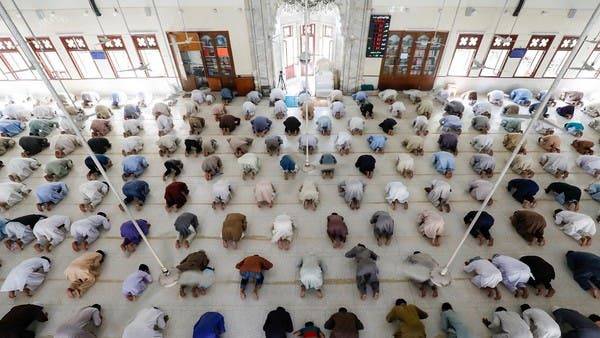
A group of senior doctors has urged the ruling party Pakistan Tehreek-e-Insaf (PTI) to withdraw its decision of permitting congregational prayers in Ramzan, and restore the previous decision of allowing only 3-5 persons to offer prayers in mosques.
The senior doctors on Tuesday wrote a letter to the government, expressing ‘strong reservations’ over the government’s recent decision to allow prayer congregations. The letter warned that with mosques across the country would be filled predominantly by people over the age of 50, risking the lives of many. It said videos video and photo evidences have shown that more than 80 per cent of the people attending prayers in mosques were mostly in their 60s and 70s. "Clearly this has resulted in the violation of the first and foremost principle of preventing the spread of the virus in the most vulnerable group of elderly people.”
The doctors said that in the holy month of Ramzan, more worshippers would head to mosques comparatively, and the congregational Taraveeh prayers would lead to prolonged gatherings. “It is all but certain that this will cause significant mayhem, as the mosques practising social distancing will only be able to accommodate 20-25pc of the regular namazis, which will further worsen the situation," it added.
According to the letter, the mismanagement could also result in conflicts between worshipers, mosque administrations and law enforcement agencies, as observed in some areas of Karachi recently. "We fear that allowing congregational prayers in larger number in our mosques may contribute to such fatal outcomes," the letter stated.
While noting that Pakistan is considered as a ‘fort of Islam’, the letter said that the existence of the Muslim world is closely linked to the strength and progress of Pakistan. "In these circumstances, if Covid-19 disease becomes an epidemic in Pakistan and the government loses control of its management in the country, it will not just be a failure of Pakistan as a country but it may have substantial unwanted and unforeseen effects on the whole Muslim ummah," the letter said.
It also cautioned that while doctors and paramedics were ready to put their lives at risk, adding “if healthcare professionals in Pakistan die as per the trend seen in other countries, there won’t be many resources [left] including manpower to look after the patients".
On Saturday, President Dr Arif Alvi after meeting the top clerics of Pakistan, announced that the government would not stop citizens from visiting mosques. The federal government accepted almost all demands of the clerics related to the holding of Friday, Taraveeh and daily congregational prayers with the condition of social distancing and other precautionary measures.
The senior doctors on Tuesday wrote a letter to the government, expressing ‘strong reservations’ over the government’s recent decision to allow prayer congregations. The letter warned that with mosques across the country would be filled predominantly by people over the age of 50, risking the lives of many. It said videos video and photo evidences have shown that more than 80 per cent of the people attending prayers in mosques were mostly in their 60s and 70s. "Clearly this has resulted in the violation of the first and foremost principle of preventing the spread of the virus in the most vulnerable group of elderly people.”
The doctors said that in the holy month of Ramzan, more worshippers would head to mosques comparatively, and the congregational Taraveeh prayers would lead to prolonged gatherings. “It is all but certain that this will cause significant mayhem, as the mosques practising social distancing will only be able to accommodate 20-25pc of the regular namazis, which will further worsen the situation," it added.
According to the letter, the mismanagement could also result in conflicts between worshipers, mosque administrations and law enforcement agencies, as observed in some areas of Karachi recently. "We fear that allowing congregational prayers in larger number in our mosques may contribute to such fatal outcomes," the letter stated.
While noting that Pakistan is considered as a ‘fort of Islam’, the letter said that the existence of the Muslim world is closely linked to the strength and progress of Pakistan. "In these circumstances, if Covid-19 disease becomes an epidemic in Pakistan and the government loses control of its management in the country, it will not just be a failure of Pakistan as a country but it may have substantial unwanted and unforeseen effects on the whole Muslim ummah," the letter said.
It also cautioned that while doctors and paramedics were ready to put their lives at risk, adding “if healthcare professionals in Pakistan die as per the trend seen in other countries, there won’t be many resources [left] including manpower to look after the patients".
On Saturday, President Dr Arif Alvi after meeting the top clerics of Pakistan, announced that the government would not stop citizens from visiting mosques. The federal government accepted almost all demands of the clerics related to the holding of Friday, Taraveeh and daily congregational prayers with the condition of social distancing and other precautionary measures.
